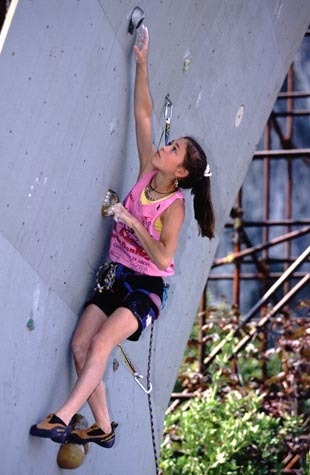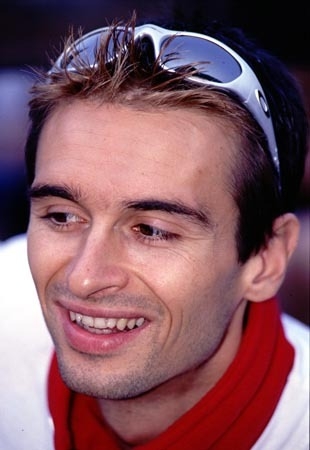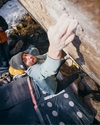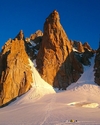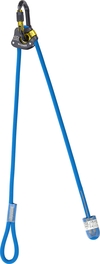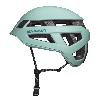Yuji Hirayama
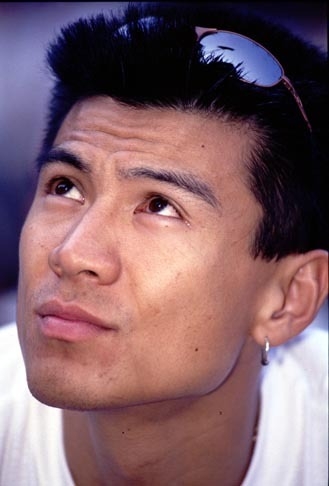
 1 / 1
1 / 1 Planetmountain.com
Planetmountain.com
Maybe I didn’t give it everything, maybe I gave 80% of my effort but I think I am happy.
What were your expectations?
Last Saturday I got injured so I didn’t think very much about how I would do, I just wanted to do my best.
Did Ovchinnike surprise you?
Very much because of his physical potential which is impressive.
Does the redpointing formula help you understand how the actual competition will go, or is it still difficult to gauge?
Yes, I knew a lot of things, but maybe not enough, you know, because I fell like that. I am sure if I had worked the route a little bit better I could have gone on at least a few more meters.
How did you find the routes?
I found them very delicate, hard and delicate balancing, this kind of climbing. It is very different from last year.
Are you preparing for any other competitions?
I am thinking about the World Championship at the end of this year and the World Cup in Slovenia.
Your forecast for the World Championship in Birmingham and for the World Cup?
I am sure everyone is thinking about the World Championship and I am, too; it is going to be a very nice competition because everyone is focused on it. It would be nice if I performed very well there.
Will the fact that Milan has been cancelledit affect the final result?
No, I do not think so. But it has affected me, you know, as I can go back to my family one week earlier.
What are your ideas on route setting and what is in store for route setting in the future?
This is good route setting. I think it is nice to have spectacular movements while not going too far from movements you find on natural routes; maybe if people look too much for spectacular movements, it is going to be like gymnastics. But I prefer it to follow natural rock climbing.
Do you have anything similar to the Rock Master in Japan?
We have national competitions, but only on-sight and not with as many people like here, you know.
How is sports climbing going in Japan?
It is still developing, in our country sports climbing is still a small sport.
How did you become one of the best sports climbers in the world?
I just love climbing. It does not matter if, in order to get better, it takes up all my energy: I really like it, to think, to act, I like everything in climbing.
Are you a professional climber?
Yes, I can manage to be a full time climber. Were I to do a different job, I wouldn’t be able to earn as much as I do at the moment.
Do you have a Federation in Japan, and does it help climbers financially?
We do have a Federation but it doesn’t give us any money. The only way to compete at an international level is by becoming a professional climber. That is the only way.
From your first Rock Master back in 1988, what has changed?
It is so different, even the way I see one route: today I can understand many more things, you know. 10 years ago I just arrived and thought "that is the route"! But today I can think, I can see so many things. I think 10 years of experience change people a lot.
What about the other athletes in the climbing competitions?
I can say 10 years ago we had more personality. Everyone had a different type of style, different type of expression. Today we have videos, we see so many climbers, good climbers. I think we are more efficient when we climb, but we have become too similar, I like people to be different.
How do you see the future of climbing competition?
I think it is nice to have many different types of climbing competitions, like bouldering, redpoint, on-sight. We can do many things, you know. I think it is nice that many people come to compete and that they enjoy it because everyone is different and everyone has a different way of interpreting things. I would like competitions to become bigger and more people to join and do the best they can. When you think about athletics, there are so many different specialities, it would be nice to have as many in climbing.
Are you in any way different from western climbers?
I said before that I like differences in climbing, I like to be somewhat different from other climbers, this is normal. I do not really know what I look like when I climb but maybe other people do, when they look at other climbers they know what the difference is.
Do you like climbing on different types of rock?
I really like to climb outdoors, because you always get different routes, different challenges and the challenge is very nice for me, the challenge is the best thing, so I like it! I like climbing on granite, limestone, sandstone, placing natural protection… I just like climbing.
How do you train?
I focus my training on improving either bouldering, power, stamina, or my technique. I focus on just one thing. If, say, I want to train for stamina, then I make some circuits that are 70 or 80 moves and then just do the circuits, first the easy ones then more difficult and then I do the easy circuits again before finishing. If I want to train power, then the circuits are much shorter, and I also use campus board.
Do you use weights?
No, I don't, I already have too much weight on me (he laughs)
Which climbers do you like?
There are a few climbers I like. I like the climbing style of François Legrand, he's very organised, and the style of Cristian Brenna; his passion - I like it. And, quite some time ago, the style of Stefan Glowacz, which was very aesthetic. Then, of course, there are Lynn Hill and many others.
What are your thoughts about mountaineering? Is this something that could interest you?
We are part of mountaineering, but if we want to climb a mountain of course we need time to train specifically for that. I think we could do some great things with free-climbing, maybe one day… I have always wanted to go to Himalaya and do an 8000m peak, so one day I will, if I feel like it, but it will be in the future.
One last question. Is it more important to get to the top or to climb well?
Difficult question: if you’re standing in front of the route, then the top is important. But once I’ve fallen I think about how I climbed and if I did my best. Of course though, we always want to get to the top.



 Copia link
Copia link


